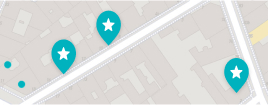ZONA ARQUEOLÓGICA DE COBÁ
City with nearly 6,500 buildings, most of which are still covered by the jungle in Coba
According to hieroglyphic inscriptions found on the site, Cobá would be the original name of the city and could mean in Maya "troubled water": the city of Cobá developed around five lakes fundamental for its subsistence. The city covers an area of 70 km² and includes nearly 6,500 buildings, most of which are still covered by the jungle, as well as stone roads, called sacbeob, plural of sacbé, which means white path. The sacbeob is a raised path of about 50 centimetres located between two low walls, filled with stones and covered with a limestone mortar. These paths were white because of the limestone stucco that covered the stones. During the peak of the site, the sacbeob connected Yaxuná, not far from Chichén Itzá, covering up to 100 kilometers.
The occupation of the site of Cobá dates from 300 to 100 B.C., but it is during the ancient classic (between 300 and 600 A.D.) that the city begins to develop, concentrating the economic and political powers and absorbing little by little the surrounding villages. The first roads were built between 600 and 800 AD, the same period in which most of the stelae found on the site were engraved. The city reached its peak between 200 and 1000 AD, when the main buildings were constructed and relations with the sites on the Gulf of Mexico intensified, while trade with the Petén region declined. Between 1000 and 1450, Cobá entered a phase of decline and was influenced by groups from the centre of the country: a new architectural style was born and incorporated into the existing buildings.
The visit: the site is relatively full from morning to evening since tours and organized trips pass by all day long. A good option to visit it is to rent a bicycle, which allows you to pedal under the forest and take the air in passing (there are also paths reserved for pedestrians only). From the entrance to the site, you first pass by the Grupo Cobá. Then a fork in the road indicates on the right a deviation towards the Grupo Macanxoc, located a few hundred metres further on in the forest: this is the least visited part of the site, which is perhaps the most enjoyable to visit. If you continue on the main path, you will come across the Grupo de las Pinturas, the Ball Game, and then the most visited monument of the site, the pyramid of the Grupo Nohoch Mul.
Did you know? This review was written by our professional authors.
Book the Best Activities with Get Your Guide
Members' reviews on ZONA ARQUEOLÓGICA DE COBÁ
The ratings and reviews below reflect the subjective opinions of members and not the opinion of The Little Witty.
The only real attraction of the site is the pyramid of Nohoch Mul, very bad state compared to what you had used to see... The ascent and downhill are delicate. The steps are very approximate... There is a rope to be booked.
But disappointment on arrival at the top. Us who pensionne to have a clear view of the other Maya monuments of the site, we only could admire the treetops.
Find unique Stay Offers with our Partners









A faire avant qu'ici aussi l'ascension soit interdite !